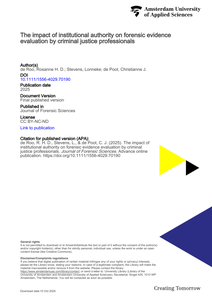The objective of this thesis is to make a first step towards prevention of the progression of chronic venous disease and the development of a first venous leg ulcer in chronic venous disease patients. The aim is to identify chronic venous disease patients at risk of developing more severe clinical stages, provide insight in the lifestyle related risk factors, and provide an overview of current chronic venous disease care in the Netherlands.
DOCUMENT

This report presents the highlights of the 7th European Meeting on Molecular Diagnostics held in Scheveningen, The Hague, The Netherlands, 12-14 October 2011. The areas covered included molecular diagnostics applications in medical microbiology, virology, pathology, hemato-oncology,clinical genetics and forensics. Novel real-time amplification approaches, novel diagnostic applications and new technologies, such as next-generation sequencing, PCR lectrospray-ionization TOF mass spectrometry and techniques based on the detection of proteins or other molecules, were discussed. Furthermore, diagnostic companies presented their future visions for molecular diagnostics in human healthcare.
DOCUMENT

Accurate and reliable decision-making in the criminal justice system depends on accurate expert reporting and on the correct interpretation of evidence by the judges, prosecutors, and defense lawyers. The present study aims to gain insight into the judiciary's capability to assess the accuracy and reliability of forensic expert reports by first examining the extent to which criminal justice professionals are able to differentiate between an accurate (or sound) expert report and an inaccurate (or unsound) expert report. In an online questionnaire, 133 participants assessed both a sound and an unsound expert report. The findings show that, on average, participants were unable to significantly distinguish between sound and unsound forensic expert reports. Second, the study explored the influence of institutional authority on the evaluation of forensic expert reports. Reports that were not recognized as flawed—particularly those originating from well-known and reputable institutions—were subjected to less critical examination, increasing the risk of evaluation errors. These results suggest that the perceived institutional authority influences the assessment of forensic evidence. The study highlights the need for tools to support criminal justice professionals in evaluating forensic evidence, particularly when experts are unregistered. Recommendations include adhering to established quality standards, consulting counter-expert evaluations, improving courtroom communication, and enhancing forensic knowledge through training. Overall, the findings underscore the importance of critical evidence evaluation to reduce the risk of misinterpretation and wrongful convictions in the judicial process.
DOCUMENT
